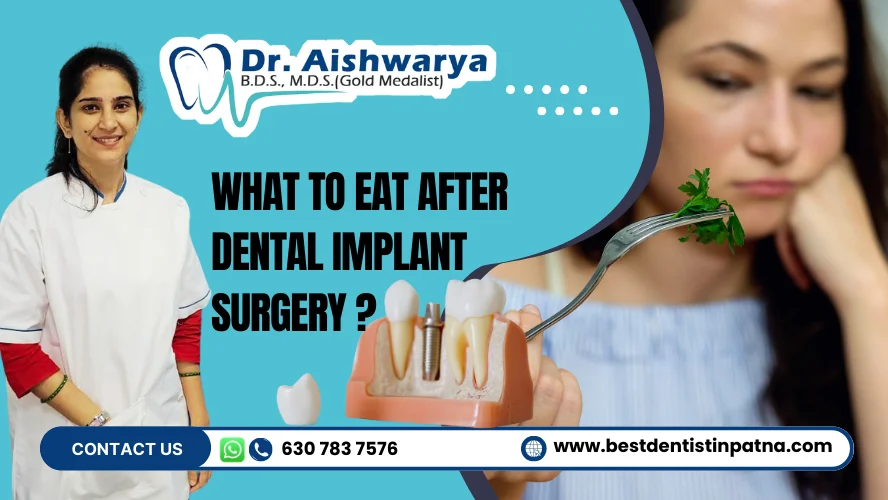
Dental implant surgery is often the best way for patients to replace teeth and bring back their smiles. The healing process after dental implant surgery depends heavily on your food choices because the procedure itself has proven successful.
Consuming inappropriate foods during recovery can put pressure on the surgery area and increase the chance of infection. Conversely, correct eating habits after the procedure supports healing and helps keep you comfortable.
The recovery diet plan in this guide follows a step-by-step approach from the first 24 hours after surgery through long-term care. The guide explains how a balanced diet supports dental implant healing and provides essential advice for oral hygiene care following dental implant surgery.
What Can You Eat After Dental Implant Surgery?
For the first 24 to 48 hours post-surgery, a diet of soft foods is necessary at the implant area. Any disruption may cause damage. The healing process will determine when you can start eating firmer foods. Therefore , careful attention is needed to the healing, avoiding undue pressure.
Stage 1: Immediately After Surgery (First 24–48 Hours)
Your mouth will experience tenderness and swelling during the initial two days after surgery. A liquid or extremely soft diet should be your only food choice during this period.
Foods to Eat:
- Smoothies (without seeds)
- Yogurt
- Applesauce
- Mashed bananas
- Lukewarm soup (not hot)
- Protein shakes
The following foods should be avoided after dental implant surgery:
- Hot and spicy foods will cause gum irritation.
- Crunchy or chewy foods including chips and bread crusts and nuts should be avoided.
- Drinking alcohol and consuming carbonated beverages.
- The use of straws creates suction which interferes with the healing process.
Following a dental implant, these initial two days of diet recommendations will help with both nourishment and minimizing both swelling and bleeding.
Stage 2: First Week Post-Surgery
The implant site continues to heal during the last week of the first month although the initial swelling has decreased. You should eat foods that are soft but offer more substance.
Foods to Eat:
- Mashed potatoes or sweet potatoes
- Scrambled eggs.
- Cottage cheese.
- Oatmeal or porridge.
- Pasta (well-cooked, soft).
- Pureed vegetables.
The foods you eat at this time give you energy and essential nutrients while protecting your implant from strain.
Dr. Aishwarya explains that your recovery success depends on proper oral care and appropriate food choices for dental implants throughout this healing period.
Stage 3: Two to Six Weeks Post-Surgery
Your gums have strengthened while the implant starts to merge with the bone structure at this point. You should introduce soft-solid foods back into your diet at a slow pace.
Foods to Eat:
- Soft-cooked fish (salmon, cod)
- Soft bread (without hard crusts).
- Steamed vegetables.
- Rice and well-cooked grains.
- Ripe fruits like peaches, pears, and mangoes
Avoid all tough, chewy, and crisp foods as they can negatively affect how the bone fuses with the implant. You will be able to return to your normal diet based on your recovery progress. This is routinely monitored by Dr. Aishwarya during her dental check-up appointments.
Stage 4: Two to Six Months Post-Surgery
The implant needs this period to bond with the jawbone because it represents the most critical phase. Your diet choices should remain cautious even though you can now eat a wider range of foods.
Foods to Eat:
- Lean meats (chicken, turkey, tender beef) cut into small pieces
- Cheese and yogurt for calcium.
- Legumes like lentils and beans.
- Whole grains.
- Soft crunchy vegetables (carrots or cucumbers, if cut into small pieces)
The following foods should be avoided after dental implant surgery:
- Hard nuts and seeds.
- Popcorn.
- Sticky candies like caramel or toffee.
- Ice cubes or very hard foods.
Following the Post-Dental Implant Diet Guidelines is key to preventing issues during your recovery.
Stage 5: Long-Term Maintenance (Six Months and Beyond)
Your ability to eat normally will return after your implants achieve full integration and your permanent crowns are installed. Your implants along with your entire oral health require proper eating habits for protection.
Foods to Enjoy:
- A healthy diet that combines proteins with whole grains and fruits and vegetables.
- Crunchy foods (apples, nuts) in moderation
- Dairy products for bone strength
The current stage requires you to stay away from hard objects such as pens and ice and bottle caps because they have the potential to damage your crowns.
Importance of a Balanced Diet for Efficient Healing After Dental Implants
The healing process depends heavily on nutrition. A balanced diet contains three essential components which include:
- Proteins for tissue repair
- The healing of bones requires both calcium and Vitamin D.
- The body needs Vitamin C to maintain healthy gums.
- The body needs Iron and Zinc to function properly as an immune system.
The process of dental implant recovery requires patients to follow a balanced diet because it leads to better healing results and extended implant lifespan. Dr. Aishwarya’s dental clinic gives patients detailed nutritional guidance alongside top-notch implant care. Our all-encompassing approach has made us the most trusted dental clinic in Patna.
Tips for Maintaining Oral Hygiene After Dental Implant Surgery
The importance of diet maintenance matches the significance of proper oral care practices. The following guidelines help patients maintain proper oral hygiene after undergoing dental implant surgery:
- Use lukewarm salt water for rinsing your mouth after eating meals. The first 24 hours requires you to avoid strong water pressure during rinsing.
- Try soft-bristled toothbrush to clean the implant site because rough brushing can cause irritation.
- Use implant-specific floss or interdental brushes to clean the area properly.
- Avoid smoking and alcohol consumption that will slow down healing processes and raise the chances of implant failure.
- Visit your dentist for scheduled appointments to check the condition of your implant.
The implementation of these guidelines will help you maintain implants that stay strong and healthy while extending their lifespan.
Dental implants are only as good as the dentist who places them. At Dr Aishwarya B.D.S., M.D.S. (Gold Medalist), we provide the finest dental implant treatment in Patna with precision for her patient’s utmost comfort and complete satisfaction.
Dr. Aishwarya guides you through every step of your procedure right from your initial visit all the way through to Post Dental Implant Diet Guidelines to make sure your experience is as smooth as possible. With Dr. Aishwarya’s tailored care, you can have the most advanced technology rebuild your tooth, resulting in a beautiful, natural-looking smile.
Conclusion
Recovering from dental implant surgery requires time, suitable care, and good nutrition. The healing process becomes faster while complications decrease when patients stick to the recommended food choices for each stage of dental implant recovery.
The recovery process depends on two essential factors which include food safety and proper oral hygiene practices. The combination of proper diet management and medical guidance will help you achieve successful dental implant results that last.
Patna’s premier dental clinic is ready to assist individuals needing implant procedures or follow-up care, all under Dr. Aishwarya’s skilled supervision. Dr. Aishwarya offers advanced techniques and customized treatments, assisting you towards a secure recovery and achieving exceptional dental aesthetics, starting you toward a healthy and vibrant smile with assurance.
Schedule your appointment with Dr. Aishwarya to start your journey toward safe recovery and perfect dental aesthetics.


